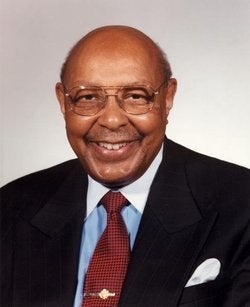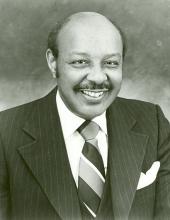The Scholarship
Louis Stokes served as a prominent attorney and the first Black congressman from Ohio elected to the U.S. House of Representatives in 1968 - a position he held for 15 consecutive terms. This fellowship honors Stokes’ community development efforts by supporting social science students dedicated to improving underserved populations.
His Story
A product of Cleveland public schools, Louis served in the U.S. Army from 1943-1946. Taking advantage of the G.I. bill, he attended Western Reserve College from 1946-1948 and received his J.D. from the Cleveland-Marshall Law School in 1953.
Stokes established a thriving law practice in Cleveland with his brother, Carl. He often worked with many high-profile clients such as football player and actor Jim Brown. However, in the 1960s Stokes began to garner a reputation as a formidable civil rights attorney—often taking cases pro-bono to defend activists. He also became heavily involved in the Cleveland chapter of the NAACP. On behalf of the NAACP, he helped challenge the Ohio redistricting in 1965 that fragmented African American voting strength. In 1967, Stokes made an oral argument before the U.S. Supreme court in Terry v. Ohio case. Known popularly as the "stop-and-frisk" case, Terry v. Ohio set the precedent for police search and seizure procedures.
Utilizing his brother's political network, Louis was elected in 1968 as a Democrat to the U.S. House of Representatives representing the 21st district of Ohio, becoming the first African-American congressman in Ohio. When the district was eliminated in 1993, Stokes moved to the 11th district until 1999 when he retired.
When Stokes retired in 1999 he resumed practicing law. He also took on the role of a distinguished visiting professor at the Jack, Joseph, and Morton Mandel School of Applied Social Sciences at Case Western Reserve University.
President Barack Obama issued an official statement on Stokes passing at the age of 90: "Growing up in Depression-era Cleveland with his mother and brother Carl, Lou triumphed over hardship to become a passionate voice for those less fortunate....Lou leaves behind an indelible legacy in the countless generations of young leaders that he inspired, and he will be sorely missed."
(Originally Published by Case Western Reserve University in The Encyclopedia of Cleveland History)



